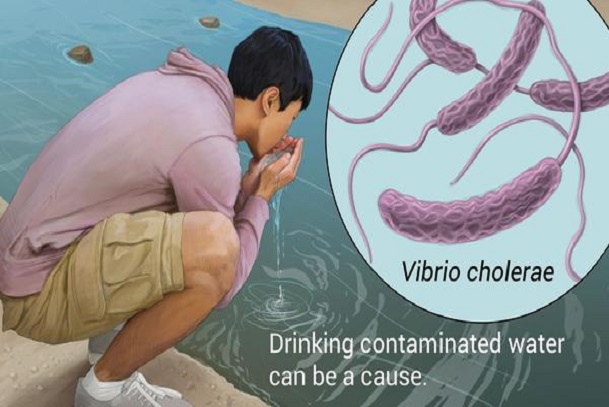 Wash your hands regularly and wear a face mask.
Learn more
Wash your hands regularly and wear a face mask.
Learn more

Cholera is an acute epidemic and infectious bacterial diseases. It is a diarrheal disease that is caused by Vibro Cholerae; a gram negative rod – shaped bacterium. It is a potentially life-threatening, primarily waterborne disease that continues to be a global threat to public health and a key indicator of lack of social development. It is both endemic and epidemic in nature.
Once common throughout the world, the infection is now largely confined to developing countries in the tropics and subtropics area. It is endemic in Africa, parts of Asia, Middle East, and South and Central America. It endemic areas, outbreaks usually occur when war or civil unrest disrupts public sanitation services, examples of this include the Boko Haram crisis in the North Eastern part of Nigeria
Although cholera is quite easy to treat, yet it is estimated to have affected between 3 and 5 million people each year, and caused over 100, 000 deaths worldwide.
In Nigeria, cholera is an endemic and seasonal disease, occurring annually mostly during the rainy season and more often in areas with poor sanitation, thus making its outbreaks not being unusual.
Although the reports regarding cholera epidemic in Nigeria haven’t been consistent over the years, the disease is dynamic in nature. The first series of cholera outbreaks was first reported between 1970 and 1990. Major epidemics also occurred in 1992, 1995 – 1996, and 1997. The Federal Ministry of Health reported 37, 289 cases and 1,434 deaths between January and October 2010, while a total of 22,797 cases of cholera with 728 deaths and case-fatality rate of 3.2% were recorded in 2011. Outbreaks were also recorded in 2018 with the Nigeria Centre for Disease Control (NCDC) reporting 42,466 suspected cases including 830 deaths with a case fatality rate of 1.95% from 20 out of 36 States from the beginning of 2018 to October 2018.
The 2010 outbreak of cholera and number of deaths recorded in some regions in Nigeria brought to the forefront the vulnerability of our poor communities and children to the disease. The outbreak was largely caused by the heavy rainfall recorded that year, and thus affected States like Jigawa, Bauchi, Gombe, Yobe, Borno, Adamawa, Taraba, FCT, Cross River, Kaduna, Osun and Rivers. Even though the epidemic was recorded in these areas, it showed that the country was at huge risk before the 2018 outbreak.
Northern States, most especially the North – Eastern region are now known to be endemic for cholera disease due to the civil unrest and socio-cultural conflicts which has left so many families displaced across the region.
In 2018, various reports were made regarding the situation of things in most IDP camps (Internally Displacement Camps) that harboured thousands of individuals who had fled for safety due to the Boko Haram attacks. It was reported that Overcrowded displacement camps coupled with a lack of basic sanitation facilities and hygiene will cause another cholera outbreak in northeast Nigeria if action was not taken now to prevent it. For instance, 466 people are sharing one latrine at one of the displacement camps in the state of Borno. As a result of lack of sanitation, people choose to defecate in the open, exacerbating an already vulnerable situation and increasing the likelihood of the spread of disease. Due to the cholera outbreaks in several locations in 2018, over 1,700 people in Mubi, Adamawa state and 400 in Bade, Yobe state.
With the current strides of weather condition in the country at large, it has been presumed that this part of the year 2019 would have an increase number of cholera outbreaks over the country.
In June, 119 new suspected cases were reported from Adamawa and Bayelsa states with no new death. As at 30th June, 2019, a total of 744 suspected cases including 18 deaths, case fatality ratio were at 2.42%) were reported from five states (Adamawa, Bayelsa, Ebonyi, Delta and Kano) since the beginning of 2019. During the month, 51 samples were collected, 23 tested; 11 RDT positive and 12 confirmed through stool culture. Of the confirmed cases, 39.7% are aged 1 - 4 years. Among all suspected cases, 55.6% are female and 44.3% male.
Presently i.e. as at 9th August 2019, active transmission of cholera is going on in Kano, Bayelsa and Adamawa States, although cases in Bayelsa State had declined over the past three weeks. Since The Adamawa State Ministry of Health (SMOH) declared an outbreak of cholera on 18th June, 2019 in four LGAs (Yola North, Yola South, Song and Girei) of the state. Since the declaration of an outbreak, a total of 586 suspected cases have been reported with four deaths; with a case fatality ratio of 0.68%.
[Next Week: How to Prevent Cholera]